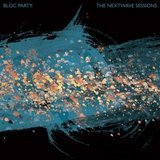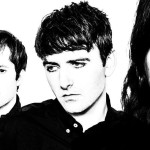It would seem that the days are numbered for Bloc Party. After extensive touring for last summer’s Four and the announcement of a new EP earlier this summer, things seemed to be looking up until the band announced an indefinite hiatus (their second since 2009) after their appearance at Latitude Festival; given the band’s documented internal troubles and drummer Matt Tong’s suspicious absence from the band’s last few gigs, it’s hard not to read these signs as the end of Bloc Party as we know it.
Before they leave for the indefinite future, the band was gracious enough to leave us The Nextwave Sessions. The title seems to imply the same raw and spontaneous feel that Four had with its all of its hiss and studio chatter. Just four dudes kicking out the jams. Well that isn’t quite the case here, as most of this EP is coated with a glossy veneer that sounds more like a direct descendant of Intimacy, Bloc Party’s messy third album.
The Nextwave Sessions is nowhere near as jarring and laborious as Intimacy, thanks to production help from Dan Carey and a more cohesive sonic palette from the band. The mournful “Obscene” might be their most successful electronic song yet, mixing pulsating waves of chords and deep bass tones to a hypnotic degree. Elsewhere, Russell Lissack coaxes some characteristically unique sounds out of his guitar; for as many curveballs as Bloc Party has thrown us over the years, Lissack’s guitar playing is one thing that’s remained consistently rewarding. His ability to go from nimble melodic leads to guitar-in-a-blender effects on a dime is in full effect again, evidenced by the icy soundscapes of “Montreal” and “Obscene” and the rubbery futuristic riffing of lead single “Ratchet”.
Ah yes, “Ratchet”. A very confounding single in a discography full of confounding singles. This song should not work at all, just look at the title. Let’s be clear, it is a dumb song. But if you’re willing to suspend your disbelief, there’s a lot to enjoy on “Ratchet,” which somehow brings Bloc Party the closest they’ve been in a while to those early Gang of Four comparisons; from the unhinged guitar to the sinewy rhythm section, the song is straight punk-funk. Kele Okereke even sounds the most excitable that he’s been since he was tutting and moaning on Silent Alarm, but if back then it sounded like he was staring down the barrel of a gun, this time he’s got his finger on the trigger. This sense of bravado cuts both ways: it’s refreshing that he’s not taking himself so seriously, but it can be a little too much to bear when he occasionally slips into pseudo-rap mode. He sounds strained fumbling through the sassy verses of “French Exit,” but pulls himself together for a typically strong performance on the song’s defiant chorus.
The main problem with The Nextwave Sessions lies in the band’s songwriting. Bloc Party could definitely be accused of trying too hard in the past, but here they just sound lazy for the most part. With all of its tension, “Montreal” seems poised for the kind of rousing climax that the band used to do so well, but ends up going nowhere, coming off more like a pretty mood piece than a song. “French Exit” and “Children of the Future” are frustratingly predictable after first listen, content to cycle through verses, choruses, and obligatory bridges with little evidence of their usual musical imagination. The latter is the worst offender, mainly because its “1979”-lite guitar hook recalls former glories like “Little Thoughts” or “Always New Depths,” but the actual song lacks the energy to pull it off. As the EP’s closer, “Children of the Future” reads very much like a band raising the white flag: “If you’re reading this, then it means we’ve failed, but all hope’s not lost, we will not be the last.”
Bloc Party have done worse than The Nextwave Sessions, and they’ve certainly done better, but at least in both of those cases they sounded bold. With the exception of “Ratchet,” the group mostly sounds tired here. Whether or not we hear from Bloc Party again is unclear, but they could surely benefit from another break.
[Rating:2.5]



